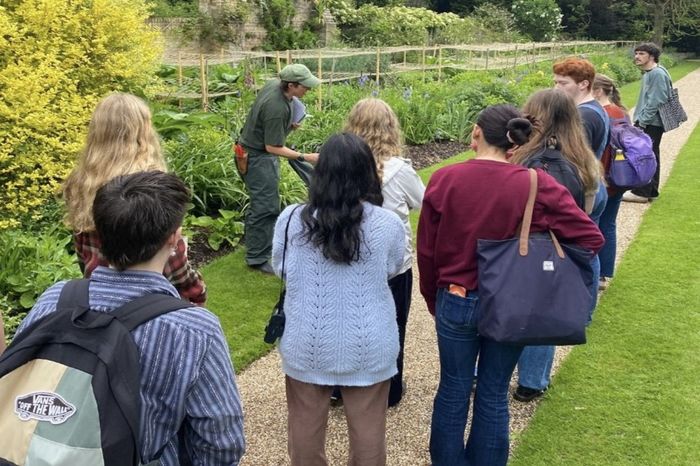Veganism shouldn’t be about perfection
Elsie McDowell looks at what happens when Veganuary ends

As January draws to close, you may well be one of the roughly 25 million people across the globe who participated in Veganuary. Or perhaps, like me, you didn’t, despite being someone who is trying to eat fewer animal products.
On the face of it, Veganuary is a great idea. It capitalises on the New Year health kick and makes you commit to, and hopefully deliver on, something. I myself became vegetarian after my friends challenged each other to not eat meat for a week; nearly seven years later, I’ve never looked back. However, cutting out several food groups overnight, and feeling like failure if you do not immediately succeed, is not necessarily the best or easiest way to reduce your meat consumption.
Last year, a reported 2,100 vegan products and menu options were launched globally for Veganuary and, according to YouGov, some 75% of the UK population are aware of its existence. I am by no means knocking Veganuary. As a vegetarian myself, I have seen how much public awareness of and provision for plant based diets has improved in recent years.
I’ve wanted to participate in Veganuary for years, but something always got in the way. In secondary school, I told myself I would do it at uni so that I didn’t have to eat separately from the rest of my family. I didn’t anticipate Cambridge’s short terms, so for the last two years I’ve insisted that I’ll do my own personal ‘Vebruary’ to make up for it, but again, I’ve never fully committed.
"As with most “sustainable” lifestyle changes, most of the impact is in the bigger picture"
It is undeniable that the planet cannot sustain meat and dairy consumption at the rate that it is consumed in the West today. Meat accounts for more than 60% of food-related emissions, and is the main driver behind deforestation globally. However, insisting on perfection is not the best way to reduce global meat and dairy consumption. Many people are deterred from reducing their consumption of animal products by the idea that the only way to have an impact is to cut them out entirely.
As with most “sustainable” lifestyle changes, most of the impact is in the bigger picture, rather than your own field of influence. The goal should be as many people as possible reducing their meat consumption overall, rather than a small group of people eating none. I am by no means saying that you shouldn’t go fully vegetarian or vegan if you wish to, but instead that for those people who do not – for want of a better phrase – want to go cold turkey, don’t focus on perfection. Go vegan except for the thing that stops you.
For years I’ve told people that I could never go vegan because I like cheese too much. So, I cut out pretty much all dairy except it; oat milk has become my go to for my porridge, and the Aldi soy yogurt is all of 40p more expensive than its cheapest dairy counterpart. I put cheese on my otherwise vegan lasagne, and always agree to milk chocolate powder on my oat cappuccinos. I am not a perfect vegan, and wouldn’t describe myself as one. But I also feel a strong moral obligation to minimise the suffering of our non-human neighbours on this planet.
"Go vegan except for the thing that stops you"
The angry vegan stereotype has done much disservice to an otherwise empathetic movement, and online conversations around plant-based diets tend towards the extremes. In reality, it is not my place to tell anyone else what they should or shouldn’t eat, I can only explain the reasons behind my own choices. Most of my family eat meat, as do most of my friends. I generally adopt a policy of not mentioning my vegetarianism unless I’m asked. Acting ‘holier than thou’ or making people feel ashamed ultimately will not reduce global meat consumption.
Instead, we need to be honest that sustainability is bigger than any one of us, and there is no one way to live a “sustainable” life. Becoming a vegetarian is one of the best decisions I ever made, and it makes me feel proud that I lead my life in accordance with what I think is right. However, I do not think I have single handedly solved the climate crisis with my tofu. Instead, I want to have open, honest conversations with the people in my life about why veganism and vegetarianism are about more than perfection.
Want to share your thoughts on this article? Send us a letter to letters@varsity.co.uk or by using this form.
 Comment / Cambridge’s tourism risks commodifying students18 April 2025
Comment / Cambridge’s tourism risks commodifying students18 April 2025 News / Cambridge student numbers fall amid nationwide decline14 April 2025
News / Cambridge student numbers fall amid nationwide decline14 April 2025 News / Greenwich House occupiers miss deadline to respond to University legal action15 April 2025
News / Greenwich House occupiers miss deadline to respond to University legal action15 April 2025 Comment / The Cambridge workload prioritises quantity over quality 16 April 2025
Comment / The Cambridge workload prioritises quantity over quality 16 April 2025 Sport / Cambridge celebrate clean sweep at Boat Race 202514 April 2025
Sport / Cambridge celebrate clean sweep at Boat Race 202514 April 2025





